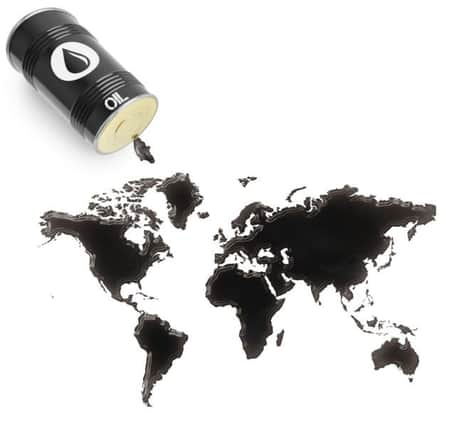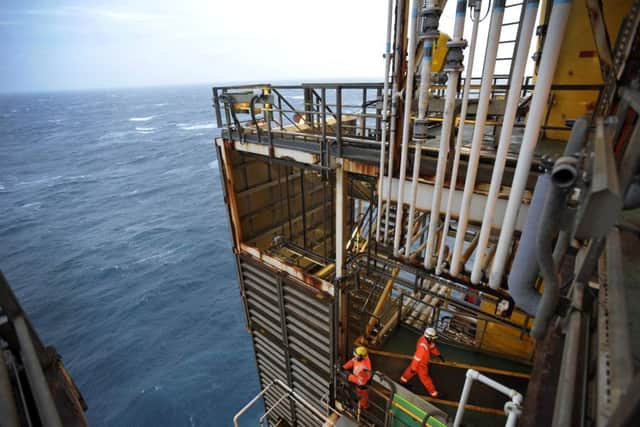North Sea oil industry struggling on slippery slope


Oil majors around the globe are struggling to make the best of a bad situation, but at the moment the return on every project shelved and job shed seems to be yet more adversity.
The confirmation last week that BP will pump an additional $1 billion (£646 million) into one of its cornerstone North Sea assets was welcome respite for Britain’s offshore industry, yet next month’s economic report from Oil & Gas UK is still set to make grim reading. Exploration, investment and employment are all on the decline, with no end on the immediate horizon.
Advertisement
Hide AdAdvertisement
Hide AdBP’s decision to extend the life of its Eastern Trough Area Project (ETAP) to 2030 is an apposite sign of the times. With the flood of crude on the market pushing oil prices ever lower, the majors are slashing costs while at the same time attempting to wring every last drop from their existing assets. Those such as BP, Shell and Total are helped by profitable refining operations, but increasing output has exacerbated oversupply.


BP managed to cut $1.7bn in costs during the first half of this year, but its profits still plunged by 64 per cent in the second quarter, when the price of Brent crude averaged $62 a barrel. That was down from $110 in the second quarter of 2014.
This dramatic act took another downward turn last week as Brent fell through the key $50 barrier to a fresh six-month low. Producers are digging in for a prolonged downturn, as outlined by BP chief executive Bob Dudley during the latest financial results.
“We hold the view that oil prices will be lower for longer,” he said. “If you look at the impact of what could be increasing Iranian production next year, slower Chinese growth… and if you take the three largest oil producing areas on the planet – the US, Saudi (Arabia) and Russia – all their production is rising.”
The Saudis stopped supporting oil prices in November, opting instead to flood the market in an attempt to drive out rivals. This has forced the shelving of high-cost projects in areas such as the Arctic, the deep waters of the mid-Atlantic and the Canadian tar sands, where up to $200bn of spending has been deferred.
But the glut has not halted the widely-hailed shale revolution in the US, which has proven more resilient as frackers have driven down their extraction costs. This has been accompanied by slowing demand from China, while Iran has indicated it plans to step up supplies as soon as the international sanctions against it are lifted.
The prognosis is therefore further spending cuts by the majors, with estimates that global investment will fall by another 5 to 15 per cent next year.
While some have likened the downturn to the crash of 1986 – when oil prices plunged from $30 to $10 as OPEC flooded the market – Bob Ruddiman of Pinsent Masons says the UK Continental Shelf (UKCS) is “now a more complex picture” than it was then. High costs, maturing fields and the looming expense of decommissioning make for a more precarious situation in the North Sea than elsewhere.
Advertisement
Hide AdAdvertisement
Hide AdThe North Sea is now the most expensive offshore basin in the world, with unit operating costs rising to a record £18.50 per barrel last year. Total operating expenditure was 8 per cent higher at £9.6bn.
Following the recommendations from last year’s Wood Review, the industry is striving to improve efficiencies through a series of initiatives that include sharing certain resources. This is expected to lead to a fall in operating costs this year, but the question is whether this will keep pace with declining oil prices.
“There was a degree of confidence coming back, even around $60, and people were hoping it would settle there,” says Ruddiman, the global head of energy at Pinsent Masons. “If there is a sense of stability that would help. A price in the mid-$60s or low $70s – that would definitely help.”
Alex Kemp, professor of petroleum economics at the University of Aberdeen, says the immediate prospects for new exploration in the North Sea are “very dismal”. In its latest activity survey, Oil & Gas UK projected that as few as eight exploration wells will be drilled this year as the downward trend from 2009 continues.
“The industry is going through very difficult times,” Kemp says. “We expect those difficult times to continue through this year and extend into next year.”
Hundreds of North Sea jobs have been shed in recent months, the latest being Thursday’s announcement that Taqa Bratani would cut its offshore headcount by about 100. The news came just a week after Wood Group and Ensco revealed they were both in consultations over job losses.
Many are also finding it difficult to shift unwanted assets, as unstable oil prices and questions over decommissioning costs cloud the deal landscape. Shell and Esso sold their stakes in the Anasuria cluster to a pair of Malaysian firms last week, but reports indicate that a growing number of assets have been on the block for months with no takers.
Despite the current challenges, Kemp expects activity to pick up from 2017, with new fields and incremental projects in central and northern parts of the North Sea, as well as west of Shetland.
Advertisement
Hide AdAdvertisement
Hide AdRuddiman is equally confident in the long-term fundamentals.“I have yet to see a headline anywhere that says we are about to stop consuming hydrocarbons,” he says. “That’s important, and you have got to keep it in mind.”
Industry Performance on the UK Continental Shelf (UKCS) in 2014
» Exploration activity was significantly worse than anticipated, with only 14 of the expected 25 wells actually drilled.
» The industry delivered production revenues of £24.4 billion, the lowest since 1998.
» Operating expenditure rose by 8 per cent to £9.6bn.
» Unit operating costs rose to a record £18.50 per barrel, up from £17 in 2013.
» Capital investment amounted to £14.8bn, half of which was spent on just 12 fields.
» The industry recorded a negative cash flow of £5.3bn, the worst position since the 1970s.
» Oil prices averaged $99 per barrel in 2014, sinking to $76 in the final quarter and $55 by the end of the year